Chalte Chalte
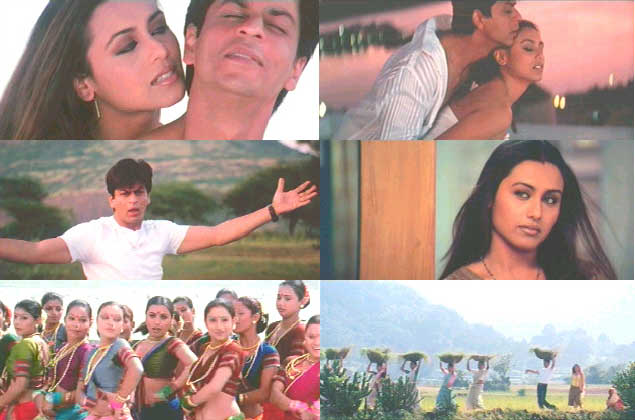
Director: Aziz Mirza
Music: Jatin-Lalit & Aadesh Shrivastava;
Lyrics: Javed Akhtar
Year: 2003
Length: 2 hours 46 minutes
Superstar Shahrukh Khan hadn't been very
visible for a period of time until this film came out in mid 2003 due to
his well-chronicled back problems that had landed him in the hospital on
a few occasions. For this one though he was producer as well as lead actor
and so dragged himself out of bed each day and performed his duties often
in wrenching pain. Knowing this background made me flinch each time he did
his dance numbers and particularly in one scene when he takes a nasty fall
over a cart. His doctor must have wanted to have him committed. The film
also received mass pre-production publicity when Shahrukh in his role as
producer fired the initial lead actress Aishwarya Rai after her snippy ex-boyfriend
Salman Khan unexpectedly showed up on the sets and caused a major ruckus.

All of these factors led to a great deal of hype and hope for the film that
in most critical opinions was generally left unrealized. One thing the film
had going against it was that its plot and structure was very similar to
the film Saathiya that had been released only months previously to a very
positive reception. This and also the fact that both films starred Rani Mukerjee
in the lead female role made comparisons unavoidable - and on most levels
Chalte Chalte comes in second. Another aspect of the film that made many
shake their heads in disappointment is that the character Shahrukh plays
in Chalte Chalte is often not very likable and his fans prefer Shahrukh as
the fluffy charming boy toy. I thought this was actually one of his most
interesting multi-faceted roles and one that could be interpreted by viewers
in a number of ways, but there are definitely many occasions in which you
just want to spank him for being such a jerk. Overall, I enjoyed this film
a fair amount – with these two charismatic lead actors it is difficult not
to – but at the same time it did feel clunky in parts, was not particularly
stylish and lacked the kind of emotional big bang that one might hope for.
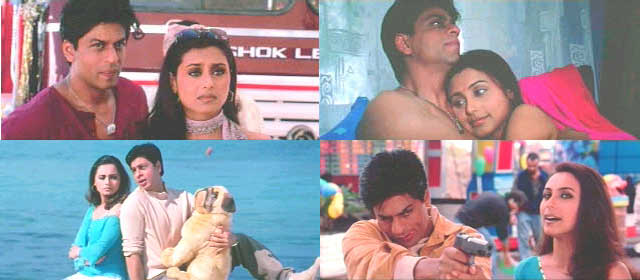
The film is divided into two very structured halves - marked by the intermission
- the flowery over heated courtship and then the real life that follows.
This is fairly rare for most Bollywood films (and most romances anywhere
for that matter) that generally end with the couple finally getting the blessings
of their families and performing the wedding ceremony with a "happy ever
after" future assured and assumed. This may seem especially unlikely though
when you consider that in these Bollywood films the lovers often come from
very different backgrounds - either economically or socially - and the chances
of a happy marriage are statistically reduced. This film explores those differences
and the difficulties it can create in a marriage.

Shahrukh is trying his best to make a go of running a small fleet of trucks
and he seems to have no helpful family connections - in fact no family at
all. While driving one of his trucks he has a near accident with an expensive
automobile driven by Rani Mukerjee and in the ensuing argument the class
differences between the two are made explicit. It doesn't matter to Shahrukh
of course and he falls in love on the spot - seeing Rani of course makes
this all too understandable even if she is cursing you out! He ends up having
to give her a ride to Bombay and on the way they of course stop to dance
and sing - the Indian countryside often makes that inevitable and few things
get to a man’s heart like watching a beautiful woman dancing among sheep.

After dropping her off, he loses her phone number and thus spends the next
two weeks dancing through the streets of Bombay - often on top of cars or
up light poles - in hopes that she will spot him. If only the Olympics had
a car roof-dancing event, India would clearly be the favorite for the Gold.
Rani in fact does see him but rather than hiding her head in hopes that this
nut doesn’t notice her, she instead informs him that in those two intervening
weeks her family has arranged her engagement and that she is leaving the
next day for Greece to have it formalized. Shahrukh stubbornly catches the
same plane in a last ditch attempt to woo her and some 20 hours, a stuffed
toy and a jump in the lake later, she has fallen for his charms and they
get married. Happy ending? Not quite.
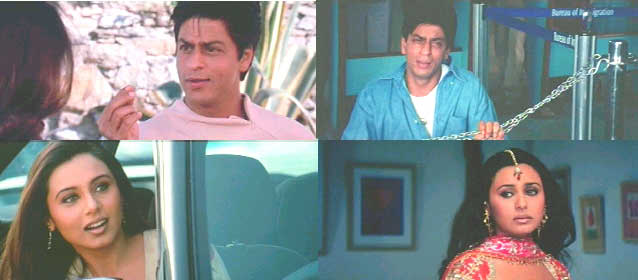
In total they have probably spent 30 hours together and know really nothing
about one another - and eventually personality differences emerge along with
class problems that hover over everything. This creates a huge boiling resentment
within Shahrukh leading to their relationship going south very quickly. It
makes for an intriguing story but not one that is always easy to watch -
the first half is so charming and the characters are so lovable though far
from perfect that it is painful seeing the marriage fall apart. It is also
extremely annoying at times seeing them act so stupidly - but of course real
people do in relationships and marriage all the time - love doesn't translate
into harmony at all – often quite the opposite. There are mixed in with the
many quarrels good times as well – often with sex lurking in the background
– and there is one wonderful scene in which Shahrukh’s towel drops and the
expression on Rani’s face is classic and speaks point blank to adult sexuality
and desire.
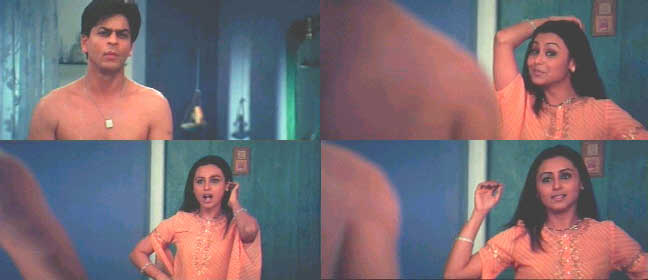
Shahrukh's character is an interesting one - not that I have a degree in
psychology (but I have seen Mr. Deeds Goes to Town (1936) many times and
this is along the lines of the court psychiatrist in that film) - but I would
diagnose him as verging on a manic depressive personality. In his manic stage
life thrills him, he falls in love in a minute, he sees no barriers towards
his love, he follows her to Greece - a woman that he barely knows and yet
who he feels he must have or his world is over. In his depressed stage everyone
is against him, everything angers him. He can't see the harm that he causes
or how unreasonable he is being. It seems clear that he has a real chemical
imbalance and should be introduced to the wonderful world of mind-pacifying
drugs! I actually wonder if the ending – which has garnered a fair amount
of criticism – is a complete fantasy of his - he has finally cracked and
is now living in his own imaginary world.

A real strength of the film are the many supporting actors that populate
the film – from ones in small roles like the policeman who can only remember
the first four numbers of Rani’s phone because he is used to the four numbers
on Indian license plates or Rani’s elitist aunt played by Lillete Dubey (the
mother in Monsoon Wedding, btw – another actor in Monsoon Wedding (Kamini
Khanna) plays the airline passenger next to Shahrukh). Most surprising is
the sweet and sympathetic performance from that perennial comic sideman and
often irritant, Johnny Lever. He plays a homeless drunk who never leaves
the spot where he used to look at his unrequited love through her window
many years in the past and sings one sad refrain from the song Dilwale Dulhania
Le Jayenge over and over again.
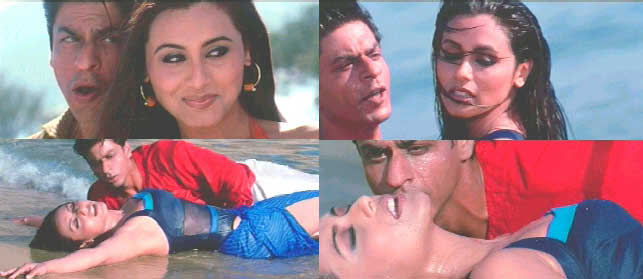
The music did not have much of an impact on me – the songs felt too similarly
paced without any song having a really strong beat that made your feet twitch.
At the same time two ballads – Suno na Suno Na and Tauba Tumhare Ye - were
very lovely. The songs though not very cleverly choreographed (though one
is very sexy!) do have some nice settings – two in Mykanos, one in the countryside
and one on the streets of Bombay. There are six songs in total. By the way
as a point of interest - how does Shahrukh drive from Mykanos to Athens as
Mykanos is an island far far away and takes about six hours by ferry to the
mainland and I don't think taking your car on it is an option.
My rating for this film: 7.0









